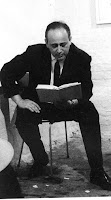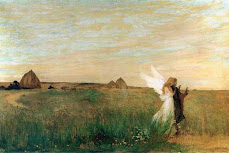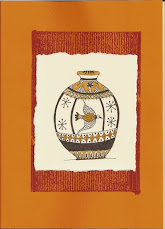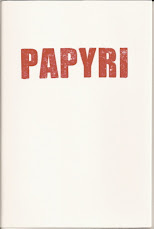- Papyri: Love-poems & fragments
from Sappho & elsewhere (2007) - Ovid in Otherworld (2006)
- The Puppet Oresteia (2008)
- Chorus 1 - Cursed with prophecy
- Chorus 2 - I ran through the wood
- Chorus 3 - Little girl lost
- Chorus 4 - Joy lives with those
- Chorus 5 - Cursed with second sight
- Chorus 6 - See how Apollo
- Chorus 7 - The labour pains
- Chorus 8 - There she goes
- Chorus 9 - Drops of holy water
- Chorus 10 - Noise is like flame
- The Britney Suite (2003)
- COVER
- TITLE-PAGE
- COPYRIGHT
- DEDICATION
- CONTENTS
- QUOTATION (Britney Spears)
- [Paul Celan:] SCHNEEPART / SNOWPART
- QUOTATION (Paul Celan)
- QUOTATION (Cut Above)
- [Wendy Nu:] keith partridge y yo
- QUOTATION (Paul Celan)
- [Paul Celan:] ERZFLITTER / ORESPARK
- QUOTATION (Paul Celan)
- Who is Wendy Nu?
- QUOTATION (ISBN)
- Nouvelle vague
- QUOTATION (Britney Spears)
- [Paul Celan:] KALK-KROKUS / CHALK-CROCUS
- QUOTATION (Paul Celan)
- Letter to the author
- [Wendy Nu:] mr darling writes to penthouse forum
- QUOTATION (Paul Celan)
- [Paul Celan:] DAS GEDUNKELTE / DARK
- QUOTATION (Paul Celan)
- QUOTATION (John Felstiner)
- QUOTATION (Nine Days)
- It’s always too late ...
- QUOTATION (Britney Spears)
- [Paul Celan:] BEIDHÄNDIGE / BOTH-HANDED
- QUOTATION (Paul Celan)
- 31 Days (2009)
- François Villon, “Ballade à s’amie”
- Heinrich von Kleist, from Die Marquise von O
- Jorge Luis Borges, “El puñal”
- Victor Hugo, from Les Misérables
- Karl Kraus, from Aphorismen
- Garcilaso de la Vega, “Soneto XXXVII”
- Guillaume Apollinaire, from L'Hérésiarque & Cie
- Johann Wolfgang von Goethe, “Gefunden”
- Benito Pérez Galdós, from Fortunata y Jacinta
- Pierre de Marivaux, from Le Legs
- Arthur Schopenhauer, from Aphorismen
- José Lezama Lima, “Retrato de Don Francisco de Quevedo”
- François-René de Chateaubriand, from Mémoires d'Outre-Tombe
- Rainer Maria Rilke, from Duino Elegies 1
- Miguel de Cervantes Saavedra, from El ingenioso hidalgo Don Quijote de la Mancha
- Arthur Rimbaud, “Ô saisons ô châteaux”
- Friedrich Heinrich Karl de la Motte Fouqué, from Undine
- D. F. Sarmiento, from Facundo: Civilización y Barbarie en Las Pampas Argentinas
- Voltaire, from Abrégé de l'Histoire Universelle depuis Charlemagne jusques à Charlequint
- Heinrich Heine, “Orpheisch”
- Augusto Roa Bastos, from "La Excavacion”
- Gérard de Nerval, “El Desdichado”
- Franz Kafka, from "Josefine, die Sängerin oder Das Volk der Mäuse"
- Sor Juana Inés de la Cruz, from Respuesta a Sor Filotea de la Cruz
- Georges Perec, from La Disparition
- Jakob & Wilhelm Grimm, from “Der Froschkönig oder der eiserne Heinrich”
- Leopoldo Lugones, “Historia de mi muerte”
- Vincent Voiture, “Pour vos beaux yeux et vostre beau visage”
- Theodor Fontane, from Vor dem Sturm
- Octavio Paz, from “La verdad contra el Compromiso”
- Jackson Wills, “Jackson's Assignment”
- Case Studies (2001)
- Flying Blind (2009)
- Theme & Variations (2010)
- Celanie: Poems & Drawings after Paul Celan (2010-12)
- Jack Ross: Poems
- Emma Smith: Drawings
- Jack Ross: Textual Notes
- Melbourne Notebook (2011-12)
- Marie de France: The Nightingale
- Choruses from the Society of Inner Light
- A Clearer View of the Hinterland (2014)
- Jack Ross: Textual Notes
- Poetry Specials (2008-2018)
- Minotaur (2008)
- Je donne à mon espoir (2008)
- Volcanic Glass (2009)
- Silhouette (2009)
- Pale Star (2011)
- Lounge Room Tribalism (2011)
- Britain's Missing Top Model (2011)
- Except Once (2012)
- Jay Checks His Father into a Home (2014)
- Ice Road Trucker (2015)
- Antigone (2015)
- 1942 (2016)
- Canberra Tales (2017)
- Rather a shock (2017)
- Time for an outing (2017)
- Malinche Dreams (2018)
- Scurvy Grass (2022)
- Collage Poems (1997-2005)
- Jack’s Metamorphoses (1997-98)
- Conversation Pieces (1997-98)
- Wharfbury Dogs (1998)
- Evenings in the Blackout (1998)
- Dieting. I’m Hungry too (2000)
- In the Cave of Henry James (2000)
- Ancestral Voices (2001)
- Satan’s School for Girls (2002)
- Anamorphoses (2002)
- Postcards (2002-3)
- Servants of the Wankh (2002-3)
- Suburban Apocalypse (2001-4)
- Days Under Water (2001-4)
- Citizens of the People’s Republic of Freaktown (2003-4)
- Muses (for Joanna Margaret Paul) (2004-5)
- Notes
- Can Poetry Save the Earth? (2018)
- John Clare: The Skylark (1835)
- I ♥ NZ (1999)
- Family Plot (2015)
- What to do till the sentinels come (2018)
- 1942 (2016)
- My Uncle Tommy (2018)
- Paul Celan: Matter of Britain (1957)
- Fernando Pessoa (2000)
- Three Versions from Rilke (2019)
- Orpheus. Eurydike. Hermes (1997)
- Herbsttag (1997)
- Archaïscher Torso Apollos (2019)
- The Oceanic Feeling (2021)
- Jack Ross: Online Notes
- The Zero Suite (2023)
- Give blood (26/1-7/2/08)
- Zero at the Bone (12-15/3/08)
- April Fool’s Day (1/4-18/6/09)
- Returning to Auckland after Dark (6/9-1/10/13)
- A Traveller on the Road to Emmaus (2/1-29/8/16)
- Zero is lying down today (18/1/16-22/10/17)
- New Year 2016 (19/1/16-19/10/17)
- Last night the heat got (28/1/16-7/5/17)
- What to do till the sentinels come (11-23/4/18)
- All I want (2/9/22-8/4/23)
- Catullus 101 (12/9/22-28/5/23)
Papyri
Poems, Imitations & Translations
Wednesday
Site-map
Friday
The Zero Suite (2023)
 Zero
Zero[all photographs: Bronwyn Lloyd]
The Zero Suite
(2007-2023)
i.m. Zero Tolerance Lloyd-Ross
(c. November 2007-21st April 2023)
- Give blood (26/1-7/2/08)
- Zero at the Bone (12-15/3/08)
- April Fool’s Day (1/4-18/6/09)
- Returning to Auckland after Dark (6/9-1/10/13)
- A Traveller on the Road to Emmaus (2/1-29/8/16)
- Zero is lying down today (18/1/16-22/10/17)
- New Year 2016 (19/1/16-19/10/17)
- Last night the heat got (28/1/16-7/5/17)
- What to do till the sentinels come (11-23/4/18)
- All I want (2/9/22-8/4/23)
- Catullus 101 (12/9/22-28/5/23)
Labels:
2023,
The Zero Suite,
Zero,
Zero Tolerance Lloyd-Ross
Thursday
The Zero Suite (1)
Give Blood
go skateboarding
– Boy’s T-shirt
I’m going to wear jandals
today
taking a walk
on the wild side
when you just know
there’s nothing
they can
do to you
a tentative attempt
becomes the hero’s
salmon leap
our cat Zero
’s attack
on a blank
puppet
made of calico
I fulminate
to captive audiences
(taking the piss
no doubt
in furtive whispers)
not
the leap of faith
we bargained on
the fear that dogs our days
(26/1-7/2/08)
•
This poem first appeared in the collection below:
Jack Ross. Kingdom of Alt (Auckland: Titus Books, 2010): 120.
Labels:
2023,
Kingdom of Alt,
The Zero Suite
Wednesday
The Zero Suite (2)
Zero at the bone
The dark looniness
of your leaping
worries me
no pause to reflect
furry paws
outspread
food comfort sleep
combine in
strange parentheses
(just like the town
they found you in
dodging
post-Xmas traffic)
beating up
poor Smudge
before you’d met us
even
now hounding
Otis
forgiving? maybe
needy
certainly
roving emblem
of desire
claws outspread
(12-15/3/08)
•
This poem first appeared in the anthology below:
Our Own Kind: 100 New Zealand poems about animals. Ed. Siobhan Harvey (Auckland: Godwit, 2009): 67-68.
Tuesday
The Zero Suite (3)
April Fool’s Day
Dure plus que fer à mâcher
– François Villon
Dure plus que fer à mâcher
harder than iron to chew
the nine o’clock start
on the road by five to eight
– You’re sillier than I am
– No, you’re sillier
Farewell to the great kitten of time
– She knows she’ll get disturbed
every quarter of an hour
while I’m around
– Even though she sleeps
for four hours at a time
when we’re not here?
– She’s pining
Security barrier down
reverse to try the other one
A truck in front of it
Drake Security Services
& then the pen / this pen
I keep by the dashboard
in case I have a thought
whilst driving
slips out of my hand
A sign? It’s dangerous enough
to scribble stuff
when the traffic lights are red
but groping for a ballpoint
under the seat
must rate way over that
The certainty of aggravation
To be up & moving, good
The simultaneous lure
of ten more minutes in bed
combined with the cud
of problems to be chewed
& brooded over
Free-floating anxiety
seizing on what’s to hand
Dure plus que fer à mâcher
The day
awaits its – what?
Its spark?
The day awaits its dark
(1/4-18/6/09)
•
This poem first appeared in the collection below:
Jack Ross. A Clearer View of the Hinterland: Poems and Sequences 1981-2014 (Wellington: HeadworX, 2014): 137-38.
Monday
The Zero Suite (4)
Returning to Auckland after Dark
(after Su Shi)
their theme is usually parting and sorrow of lonely woman
– Xu Yuan Zhong
Drinking at evening in the airport bar
I try the pinot gris then the Monteiths
the Jetstar flight’s on timesurprise surprise
even a little early maybe
will Bronwyn be awake
when I get home?
or Zero perhaps
– less liable to forgive
my absences?
What can I do but listen to the sea
pounding on Mairangi Bay beach
like the hum of the supermarket
air-conditioning units?
audiblestrangely
halfway up the hill
rather than where we are
She’s off herself
on Saturday morning
Zero & I
will hold the fort alone
(6/9-1/10/13)
Sunday
The Zero Suite (5)
A Traveller on the Road to Emmaus
And they drew nigh unto the village, whither they went: and he made as though he would have gone further. But they constrained him, saying, ‘Abide with us: for it is towards evening, and the day is far spent’. And he went in to tarry with them.
– Luke 24: 13-15.
Wars and rumours of wars
even the sparrows look shell-shocked
as they huddle on the clothesline
seeing the New Year in
with beating rain and wind
the kitten steals the warm spot on the duvet
when I get up for a moment
treatises on how best to treat your slaves
from ISIS
shock when an All-Black
tweets corpse-snaps
from a refugee village
it should have come with a warning
prates some Tom Fool
so should the world
come in and tarry with us
even though I don’t believe in you
doubt that you ever existed
I like to think of that dusty road
that traveller joining the others
making as though he would have gone further
tarry with us a while
and bring a friend
(2/1-29/8/16)
•
This poem first appeared in the journal below:
Poetry NZ Yearbook 2021. Ed. Tracey Slaughter (Auckland: Massey University Press, 2021): 248-49.
Labels:
2023,
Poetry NZ Yearbook,
The Zero Suite
Saturday
The Zero Suite (6)
Zero is lying down today
but little specks of blood
on the bedspread
make me think
she may have run into
one of her twin nemeses
last night
Yellow
a big fat greedy
green-collared glutton
or Brindle
a raccoon-tailed
bully
each of whom
sneaks in the back door
several times a day
to eat her food
she jumps out
hisses at them
but is only a little cat
once or twice we’ve seen
them ganging up on her
unable to help her
unless it’s in plain sight
I suppose that’s it
our little cat
so wilful
cuddly
spirited
has become the thing
we most fear losing
yet cannot safeguard
threaten to crush
with the sheer weight
of our love
(18/1/16-22/10/17)
•
This poem first appeared in the journal below:
Poetry NZ Yearbook 2020. Ed. Johanna Emeney (Auckland: Massey University Press, 2020): 117-18.
Labels:
2023,
The Oceanic Feeling,
The Zero Suite
Friday
The Zero Suite (7)
New Year 2016
It takes quite a while
for things to crank into
their usual chaos
no heavy traffic on the road
for instance
parking places everywhere
no replies to emails
plaintive cries
for rooms to be changed
bodies counted
classes organised
while I sit here
typing out old titles
from the NZ Poetry Yearbook
full of sage reflections
on the scandal of Ezra Pound’s Cantos
Songs for this that & the other
what a lot of singing they did
back thenthe early names
of subsequently celebrated writers
Jowsey for Ireland
I A H Paterson for Alistair
and I think to myself
that I share this taste for stasis
dread to encounter
more ghastly bombings
what is it with building bombs?
when did that become
the sine qua non
of strong political opinions?
butI supposeup lad
thews that cumber
sunlit pallets never thrive
Zero can go back to bed
after keeping us up half the night
With demands for food
and succour
but we must endure
I’m afraid
we must endure
(19/1/16-19/10/17)
Thursday
The Zero Suite (8)
Last night the heat got
So extreme
we dragged our mattress
into the living room
under the heat pump
turned to maximum cold
even that didn’t work
because the cat
confused by the new arrangements
meowed all night
and kept us up
my mother’s memory
is quite defective
ever since the event of 0-12
‘a migraine’
said her doctors
the aphasia did wear off
but now she can’t
kickstart her memory
she often gets it if reminded
but seldom admits to knowing anything
it’s hard to explain what it’s like
she tells us
I believe her
what can it feel like
to wander in a haze
making decisions you go back on
five minutes later
no longer knowing
who your childhood stories
happened to?
perhaps it’s like
these humid nights
wrapped in a sweatsheet
unable to bear the covers
ticking away the time
in shapeless fog?
(28/1/16-7/5/17)
Subscribe to:
Posts (Atom)









































.jpg)